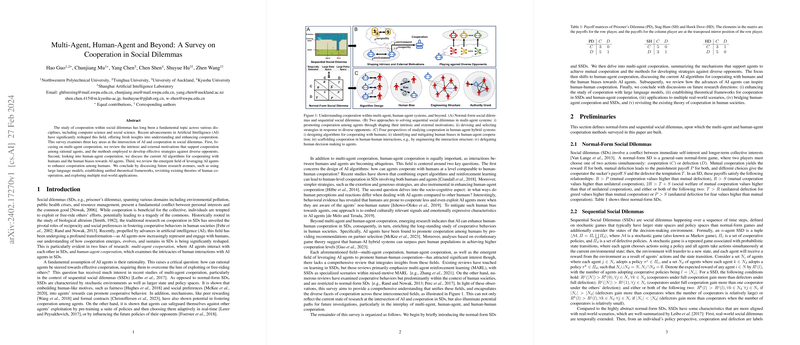The paper "Multi-Agent, Human-Agent and Beyond: A Survey on Cooperation in Social Dilemmas" provides a comprehensive examination of the evolving role of AI in fostering cooperation within social dilemmas, an area of paper traditionally explored in disciplines like computer science and social science. The survey focuses on three principal domains:
- Multi-Agent Cooperation: The paper explores how AI has been employed to facilitate cooperation among rational agents. It highlights both intrinsic motivations (such as shared goals) and external motivations (such as rewards) that are crucial for cooperation. The survey also discusses various strategies agents use to cope with and outperform diverse opponents, stressing the development of robust algorithms for strategic interaction.
- Human-Agent Cooperation: The research explores the interaction between AI and humans, detailing current AI algorithms designed for seamless human-agent collaboration. It also addresses human biases against AI partners, which can hinder effective cooperation. The authors argue that understanding and mitigating these biases is vital for improving human-agent interactions.
- Enhancing Human Cooperation Through AI: This emergent area investigates how AI can be used to amplify cooperative behaviors among humans. The paper suggests that AI agents can mediate and improve human interactions by identifying cooperation opportunities and encouraging collaborative actions.
The authors conclude by identifying future research directions, including leveraging LLMs to process and understand complex social interactions. They also propose developing unified theoretical frameworks to better integrate existing theories of human cooperation with AI advancements. Lastly, the paper emphasizes exploring practical applications in various domains, suggesting that such integration could yield significant socio-economic benefits.
The survey underscores the transformative impact of AI on studying cooperation in social dilemmas and highlights the potential of AI to bridge gaps between theoretical research and real-world applications.
